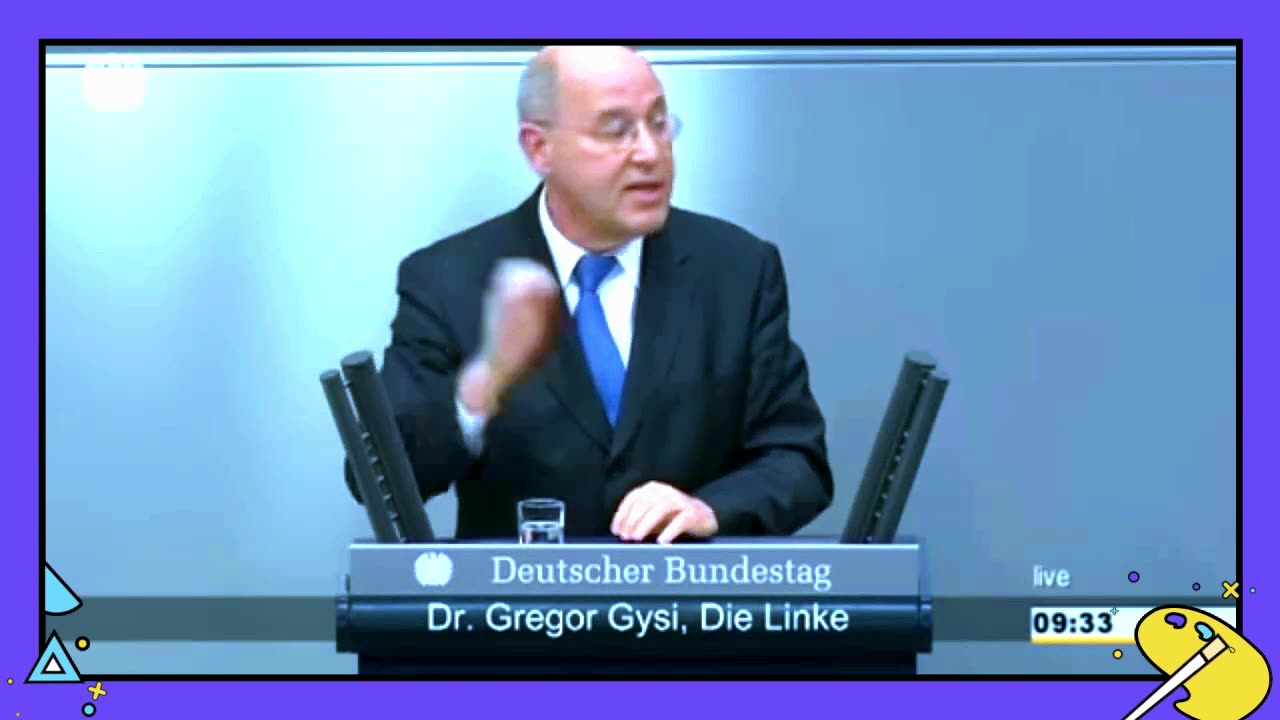Premium Only Content

Florian Gysi a permanent advertisement, please go on!
no comments!
-----------------------------------
Gregor Gysi
Gregor Florian Gysi [ˈɡiːzi] (born January 16, 1948 in Berlin) is a German lawyer, politician of the Left Party, author and presenter.
In December 1989, Gysi was elected chairman of the SED and remained in this position until 1993 after the party was renamed the PDS. After the first free People's Chamber election in 1990, he led its parliamentary group in the People's Chamber of the GDR from March to October 1990, until the formal German reunification. Following this, he was chairman of the PDS parliamentary group in the Bundestag from 1990 to 1998 and chairman of the PDS parliamentary group in the Bundestag from 1998 to 2000. In 2002, he spent five months as one of the deputy mayors and Senator for Economics, Labor and Women's Issues in a "red-red" coalition between the SPD and PDS in the Berlin Senate led by Klaus Wowereit.
Gysi became a member of the German Bundestag again in 2005. From 2005 to 2015, he was leader of the Left Party parliamentary group. During Merkel's third cabinet, he was also leader of the opposition in the legislative period of the 18th Bundestag from December 2013 to October 2015. He was later President of the European Left from 2016 to 2019.[1] From 2020 to 2023, he was foreign policy spokesperson for the Left Party parliamentary group in the Bundestag.[2]
Gregor Gysi was and is one of the central and most prominent personalities of the PDS and the Left Party and has had a formative influence on political events in federal politics since the political turnaround of 1989/1990. His political successes include the transformation of the former GDR state party SED (of which he had been a member since 1967) into the PDS and, following its merger with the SPD split-off WASG in 2007, finally into the Left Party. With increasing electoral success and seats in national parliaments, including in the West German states, Gysi made a significant contribution to the nationwide establishment of the party, which was positioned to the left of the SPD and Alliance Greens.
Background and family environment
Gregor Gysi was born in Berlin to Klaus Gysi (1912-1999), a cultural politician and former GDR diplomat, and his wife Irene, née Lessing (1912-2007), also a GDR cultural politician and director of the Kultur und Fortschritt publishing house. On his father's side, he came from a Berlin family whose progenitor, the silk dyer Samuel Gysin (* 1681), had immigrated from Läufelfingen (Switzerland) in the early 18th century.[3] One of his ancestors on his father's side was the founder of German pedigree poultry breeding, Robert Oettel. [4] Gysi has a Jewish great-grandfather on his mother's side and a Jewish grandmother on his father's.[5] Gregor Gysi's father was therefore Jewish according to the Halacha, but Gregor Gysi himself was not. "According to the Nuremberg race laws, I am only 37.5 percent Jewish; according to Jewish law, I am not Jewish at all because I don't have a Jewish mother." He himself was not a religious person at all[6].
His father Klaus Gysi, who studied economics, joined the KPD in 1931 and worked in the GDR after the Second World War. Among other things, he worked as managing director of the Aufbau publishing house, later as ambassador to Italy, as GDR Minister of Culture and State Secretary for Church Affairs. He also worked for the State Security as "IM Kurt".
On his mother's side, Gregor Gysi's ancestors came from the Jewish merchant family Lessing, who came from near Bamberg and lived and worked in St. Petersburg for a time. His great-grandfather was the industrialist Anton Lessing, who emigrated to St. Petersburg, and his great-granduncle was the founder of Bamberger Hofbräu AG, Simon Lessing. Gysis' maternal grandfather Gottfried Lessing, Anton Lessing's son, a metallurgical engineer living in Russia, married the German-Russian noblewoman Tatjana von Schwanebach. This marriage produced two children: Gregor Gysis' mother Irene and Gottfried Lessing (1914-1979), who was married in his second marriage to Doris Lessing (1919-2013), who later won the Nobel Prize for Literature and was shot as ambassador of the GDR in Kampala (Uganda).[7][8][9] After the outbreak of the First World War, the family was expelled to Germany due to their German origins.
Gregor Gysi's parents were in Germany during the Second World War. The couple were involved in the resistance against National Socialism on behalf of the KPD and married after the end of the war in 1945; they divorced in 1958.
Irene Gysi was responsible for exchanges with foreign countries in the GDR Ministry of Culture and later headed the East German branch of the International Theater Institute.
Education
Gregor Gysi was born in Berlin-Lichtenberg. He grew up in the Johannisthal district of East Berlin. He attended a polytechnic secondary school there from 1954 to 1962 and the "Heinrich Hertz" extended secondary school (a school with a mathematical focus from 1965) in the Adlershof district from 1962 to 1966. Here he obtained his Abitur in 1966 and at the same time graduated as a skilled worker for cattle breeding at VEG Blankenfelde.[10] Gysi then studied law at Humboldt University in Berlin from 1966, graduating with a degree in law in 1970.
Legal career as a lawyer in the GDR and the Federal Republic of Germany
Gysi in 1990 with fellow lawyer Lothar de Maizière (CDU), both members of the first freely elected People's Chamber of the GDR at the time of admission
Gysi was an assistant judge from 1970 to 1971. From 1971, Gysi was one of the few independent lawyers in the GDR. In this role, he also defended critics of the system and those wishing to leave the country, such as Robert Havemann, Rudolf Bahro, Jürgen Fuchs, Bärbel Bohley and Ulrike Poppe. In 1976, he received his doctorate in law with the thesis Zur Vervollkommnung des sozialistischen Rechtes im Rechtsverwirklichungsprozeß[11].
From April 1988 to December 1989, he was Chairman of the College of Lawyers in East Berlin and at the same time Chairman of the Council of Chairmen of the 15 Colleges of Lawyers in the GDR. This function was a nomenclature cadre position that could only be filled with the approval of the Central Committee of the SED.[12] On September 12, 1989, he was in Prague together with the East Berlin lawyer Wolfgang Vogel to call on the GDR refugees at the German embassy to return to the GDR. In autumn 1989, before the political change in the GDR, Gysi campaigned as a lawyer for the admission of the opposition New Forum.From August 2002 until his re-election as a member of the Bundestag in 2005 and after his resignation as parliamentary group leader of the Left Party in the German Bundestag in 2016, Gysi returned to his work as a lawyer in Berlin.In 2022, he represented an activist of the Last Generation[13].
Political career as chairman of the SED, PDS and the Left Party[edit] Edit source]
Gysi at the SED special party congress on 9 December 1989 Gysi at a PDS election campaign rally in 1990
Gysi had been a member of the SED since the age of 20 (1967). When he came into the public eye 22 years later (1989), he worked on a travel law. On November 4, 1989, Gysi spoke to 500,000 people at the mass rally on Berlin's Alexanderplatz and demanded a new electoral law and a constitutional court. At the same time, he campaigned for confidence in the new SED General Secretary Egon Krenz and recognized that the SED continued to play a leading role in the GDR. [14] His eloquence and rhetorical talent quickly made him one of the media stars of the fall of 1989. From 3 December 1989 he was a member of the working committee for the preparation of the extraordinary party congress of the SED and was chairman of an internal party committee of inquiry.
At the special party congress of the SED-PDS on December 8, 1989, Gysi rejected the dissolution and re-establishment of the SED, which was demanded by many delegates, as "highly irresponsible." He justified this with the danger of possible legal disputes over party assets and the threat of unemployment for the 44,000 full-time employees of the SED. [15] For this reason, the party name was not replaced, but only supplemented. On December 16, 1989, at the continuation of the special party congress of the SED-PDS, Gysi spoke out in favor of cooperation between the two German states while fully preserving their sovereignty. At the same time, he resolutely opposed the "discrimination" and "persecution" of former Stasi employees and their families. "Our party," said Gysi, "will always stand up for the interests of citizens in uniform." [16] At the special party congress on 9 December 1989, 95.3 percent of the delegates elected him chairman of the SED. As party chairman of the SED-PDS in the winter of 1989/90, Gysi was involved in ensuring that the SED was not dissolved and that its party assets and jobs within the party were preserved. Gysi held the party chairmanship of the PDS until January 31, 1993. After that, he continued to work first as deputy party chairman, then as a member of the party executive committee, until he finally retired from the party executive in January 1997.
On December 23, 2005, he also became a member of the WASG, just as Oskar Lafontaine also became a member of the Left Party PDS. In doing so, both demonstratively made use of the possibility of dual membership in the Left Party and the WASG. Since its founding on June 16, 2007, Gysi has been a member of the Left Party; he is also a member of the party-affiliated Rosa Luxemburg Foundation. In December 2016, he was elected chairman of the European Left.
Mandates[edit | edit source] Edit source]
Gysi at the Disability Conference of the German Bundestag 2012
1990–2002 Member of the People's Chamber of the GDR and of the German Bundestag: From March to October 1990, Gysi was a member of the first freely elected People's Chamber of the GDR, where he was chairman of the PDS parliamentary group. As such, he became a member of the German Bundestag on 3 October 1990 and as such was re-elected several times. He left the Bundestag on 1 February 2002 to take up the office of Senator for Economic Affairs in Berlin. He was chairman of the PDS parliamentary group from 1990 to 1998 and then chairman of the PDS parliamentary group until 2 October 2000.
2001–2002 Member of Parliament and City Senator in Berlin: In 2001, Gysi became a member of the Berlin House of Representatives. On 17 January 2002, he became Mayor and Senator for Economics, Labour and Women of the State of Berlin in the Senate Wowereit II, led by Governing Mayor Klaus Wowereit. On July 31, 2002, he resigned from all offices as part of the bonus miles affair. [17]
Member of the German Bundestag since 2005: For the 2005 Bundestag election, Gysi returned to federal politics as the top candidate of the Left Party. He was a direct candidate for the constituency 85 Treptow-Köpenick and led the state list of the Left Party Berlin. In the election, he was able to prevail against his competitor Siegfried Scheffler of the SPD and entered the Bundestag directly with 40.4 percent of the first votes cast. Together with Oskar Lafontaine, he was elected chairman of the Left Party on 23 September 2005.
In the 2009 Bundestag election, he also ran as the top candidate of the Berlin state list. However, he was able to improve his first vote result in his constituency of Berlin-Treptow-Köpenick to 44.4 percent and thus again entered the Bundestag by direct mandate. After Oskar Lafontaine's resignation, Gysi was appointed sole parliamentary group leader of the Left Party parliamentary group on October 9, 2009 with 94.7 percent of the vote, and was confirmed in office in 2011 with 81.3 percent.
Gysi in 2013 with Bundestag President Norbert Lammert (CDU)
In the 2013 Bundestag election, Gysi – again the top candidate of the Berlin state list – managed to defend his direct mandate again with 42.2 percent, despite slight losses of 2.2 percentage points. [18] As in 2011, he successfully rejected Sahra Wagenknecht's ambitions for a dual leadership in the parliamentary group and was re-elected sole parliamentary group chairman on 9 October 2013 at a parliamentary group retreat in Bersteland, Brandenburg. Due to the ruling grand coalition, he was thus the leader of the opposition. [19]
On 7 June 2015, he announced that he would not run again for the parliamentary group chairmanship of the Left Party. [20][21] Accordingly, he resigned from both offices on October 12, 2015. His successors in the parliamentary group chairmanship and thus also in the opposition leadership were Dietmar Bartsch and Sahra Wagenknecht.
In the 2017 Bundestag election, Gysi again won the mandate as a direct candidate in the Bundestag constituency of Berlin-Treptow – Köpenick and did not allow himself to be secured by the state list. [22][23] On 5 May 2020, he was elected foreign policy spokesman by his parliamentary group to succeed Stefan Liebich, having already taken over the latter's place in the Bundestag's Foreign Affairs Committee in April 2020. [24] Gysi relinquished this office in September 2023. [25] In the 19th legislative period (as of August 2020), he received at least 470,000 euros from secondary employment. [26]
For the 2021 Bundestag election, he repeated his direct candidacy in his constituency without being on the state list at the same time. He won, among others, against the Olympic champion and federal policewoman Claudia Pechstein (CDU). Gysi's successful candidacy is one of the three direct mandates that his party was able to bring into the Bundestag through § 6 (3) sentence 1 of the Federal Elections Act, although the party failed to pass the five percent hurdle in the election.
Criticisms after the reunification of Germany[edit] Edit source]
Accusation of concealment of SED assets[edit] Edit source]
Gysi during a police investigation of the PDS party building on October 19, 1990 in Berlin
At the special party congress of the SED on 8/9 and 16/17 December 1989, Gregor Gysi supported the continued existence of the SED under a new name ("SED-PDS") with the argument, among other things, that a dissolution and re-establishment would entail legal disputes over party assets and would be a serious economic threat to the party. [27] The Independent Commission for the Verification of the Assets of the Parties and Mass Organizations of the GDR accused him of having been actively involved in the concealment of SED party assets and of having tried in the Putnik deal to move SED funds abroad with the help of the CPSU in order to secure them from the grasp of state agencies. [28] The 1998 committee of inquiry of the German Bundestag on the whereabouts of the SED party assets stated that Gysi had remained silent during his questioning and thus, together with other PDS functionaries, had obstructed the work of the committee. [28] However, he could not be proven to have actively participated.
Left-wing MPs are observed by the Office for the Protection of the Constitution[edit] Edit source]
See also: Observation of the Left Party by the Office for the Protection of the Constitution
In January 2012, it became known that Gregor Gysi, as one of 27 members of the Bundestag of the Left Party, was under observation by the Federal Office for the Protection of the Constitution,[29] which was criticized by politicians of all parliamentary groups. [30]
After this surveillance had been discontinued at the beginning of 2014,[31] the Administrative Court of Cologne ruled in an acknowledgment judgment in September 2014 that Gysi's personnel file had to be destroyed.
-
 8:20
8:20
CarlCrusher
18 hours agoUFO Alien Base Hiding under Secret Mountain Sedona Arizona says Danny Sheehan - Bradshaw Ranch
3.49K1 -
 50:49
50:49
PMG
17 hours ago"They're Vaccinating Our Food Supply with DNA - Tom Renz"
4.92K1 -
 56:54
56:54
Uncommon Sense In Current Times
10 hours ago"Reclaiming Our Voice: A Christian Perspective on Politics and Parenting With John DeBerry"
3.63K -
 59:27
59:27
Trumpet Daily
22 hours ago $4.75 earnedDesperate Dems: Trump Supporters Are Dumb, Deplorable Garbage Trumpet Daily | Nov. 1, 2024
6.4K20 -
 5:51
5:51
Memology 101
9 hours ago $0.16 earnedCNBC anchor OBLITERATES NJ Governor as he FAILS to elaborate a single policy he likes from Kamala
3.64K20 -
 3:09:56
3:09:56
The Jimmy Dore Show
19 hours agoRumble Time Live Panel Show w/ Jimmy Dore & Special Guest Tucker Carlson!
111K9 -
 3:39:01
3:39:01
Fresh and Fit
15 hours agoCatching Predators In Los Angeles with Vitaly & Noah Atwood
163K45 -
 14:08:57
14:08:57
Right Side Broadcasting Network
2 days agoLIVE REPLAY: President Trump Holds a Rally in Milwaukee, WI - 11/1/24
353K3 -
 52:14
52:14
Talk Nerdy 2 Us
22 hours agoHacks, Scandals, and Espionage: Inside Today’s Most Shocking Cyber Heists!
87.9K18 -
 1:58:45
1:58:45
I_Came_With_Fire_Podcast
20 hours agoLive Fire (No Exercise)
72.7K8